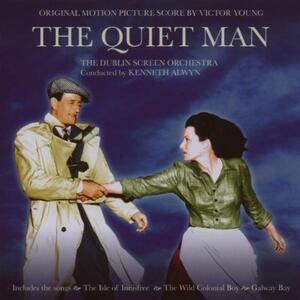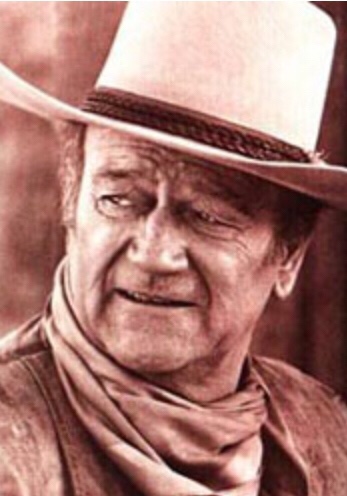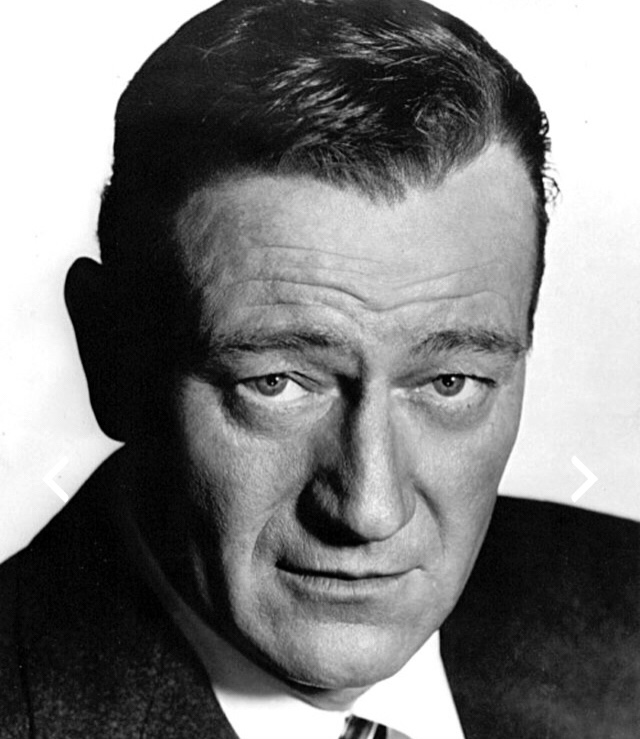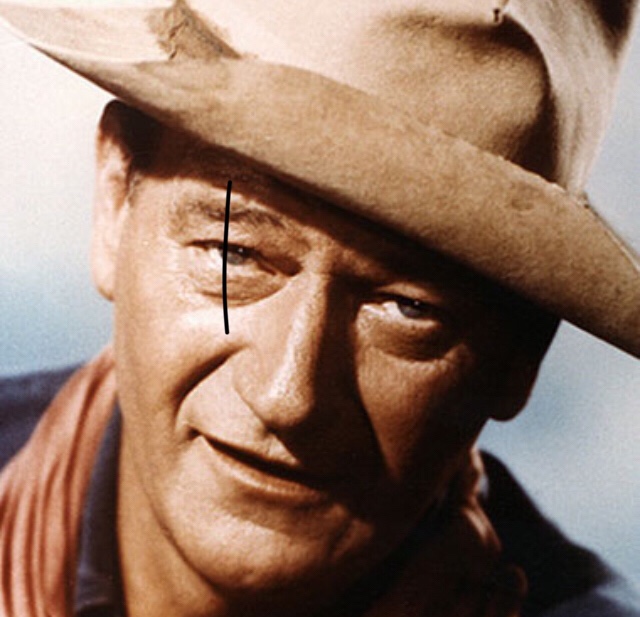
john wayne , pseudonimo di Marion Mitchell Morrison (Winterset, 26 maggio1907 – Westwood, 11 giugno1979), è stato un attore e registastatunitense.Soprannominato Duke (Duca), cominciò la carriera con il cinema muto negli anni venti, diventando poi fra gli anni quarantae gli anni settanta uno degli attori più famosi del mondo, celebre soprattutto per i suoi film western, ma anche per molti altri ruoli in generi differenti. Si identificò nel ruolo dell’eroe senza macchia e senza paura, rude ma generoso ed è considerato una leggenda del cinema: l’American Film Institute l’ha inserito al tredicesimo posto tra le più grandi star della storia del cinema....
Filmografia
Attore
- Lo studente (Brown in Harvard), regia di Jack Conway (1926) - non accreditato
- Bardelys il magnifico (Bardelys the Magnificent), regia di King Vidor (1926) - non accreditato
- The Great K & A Train Robbery, regia di Lewis Seiler (1926) - non accreditato
- Annie Laurie, regia di John S. Robertson (1927) - non accreditato
- L'atleta innamorato (The Drop Kick), regia di Millard Webb (1927) - non accreditato
- La canzone della mamma (Mother Machree), regia di John Ford (1928) - non accreditato
- L'ultima gioia (Four Sons), regia di John Ford (1928) - non accreditato
- La casa del boia (Hangman's House), regia di John Ford (1928) - non accreditato
- L'arca di Noè (Noah's Ark), regia di Michael Curtiz (1928) - non accreditato
- Rivincita (Speakeasy), regia di Benjamin Stoloff (1929) - non accreditato
- La guardia nera (The Black Watch), regia di John Ford (1929) - non accreditato
- Words and Music, regia di James Tinling (1929)
- Saluto militare (Salute), regia di John Ford e David Butler (1929) - non accreditato
- The Forward Pass, regia di Edward F. Cline (1929) - non accreditato
- Il sottomarino (Men Without Women), regia di John Ford (1930) - non accreditato
- Temerario nato (Born Reckless), regia di Andrew Bennison e John Ford (1930) - non accreditato
- La traccia bianca (Rough Romance), regia di A.F. Erickson (1930) - non accreditato
- Cheer Up and Smile, regia di Sidney Lanfield (1930) - non accreditato
- Il grande sentiero (The Big Trail), regia di Raoul Walsh (1930)
- Girls Demand Excitement, regia di Seymour Felix (1931)
- Three Girls Lost, regia di Sidney Lanfield (1931)
- Arizona, regia di George B. Seitz (1931)
- The Deceiver, regia di Louis King (1931)
- The Range Feud, regia di D. Ross Lederman (1931)
- Maker of Men, regia di Edward Sedgwick (1931)
- The Shadow of the Eagle, regia di Ford Beebe (1932)
- Texas Cyclone, regia di D. Ross Lederman (1932)
- Two-Fisted Law, regia di D. Ross Lederman (1932)
- Cuore d'amanti (Lady and Gent), regia di Stephen Robets (1932)
- Uragano express (The Hurricane Express), regia di J. P. McGowan e Armand Schaefer (1932)
- Ride Him, Cowboy, regia di Fred Allen (1932)
- That's My Boy, regia di Roy William Neill (1932) - non accreditato
- The Big Stampede, regia di Tenny Wright (1932)
- Haunted Gold, regia di Mack V. Wright (1932)
- The Telegraph Trail, regia di Tenny Wright (1933)
- Eroi senza patria (The Three Musketeers), regia di Colbert Clark e Armand Schaefer (1933)
- Ala errante (Central Airport), regia di William A. Wellman (1933) - non accreditato
- Somewhere in Sonora, regia di Mack V. Wright (1933)
- La seconda aurora (The Life of Jimmy Dolan), regia di Archie Mayo (1933)
- His Private Secretary, regia di Phil Whitman (1933)
- Baby Face, regia di Alfred E. Green (1933)
- The Man from Monterey, regia di Mack V. Wright (1933)
- Il cavaliere del destino (Riders of Destiny), regia di Robert Bradbury (1933)
- College Coach, regia di William A. Wellman (1933) - non accreditato
- Il giustiziere del West (Sagebrush Trail), regia di Armand Schaefer (1933)
- La valle dell'oro (The Lucky Texan), regia di Robert N. Bradbury (1934)
- West of the Divide, regia di Robert N. Bradbury (1934)
- Acciaio blu (Blue Steel), regia di Robert N. Bradbury (1934)
- L'invincibile dello Utah (The Man from Utah), regia di Robert N. Bradbury (1934)
- Il cavaliere muto (Randy Rides Alone), regia di Harry L. Fraser (1934)
- La valle del terrore (The Star Packer), regia di Robert N. Bradbury (1934)
- La traccia infernale (The Trail Beyond), regia di Robert N. Bradbury (1934)
- La frontiera senza legge (The Lawless Frontier), regia di Robert N. Bradbury (1934)
- Sotto i cieli dell'Arizona (Neath the Arizona Skies), regia di Harry L. Fraser (1934)
- I gangsters del Texas (Texas Terror), regia di Robert N. Bradbury (1935)
- Rainbow Valley, regia di Robert N. Bradbury (1935)
- Un sentiero nel deserto (The Desert Trail), regia di Lewis D. Collins (1935)
- Cavaliere all'alba (The Dawn Rider), regia di Robert N. Bradbury (1935)
- Paradise Canyon, regia di Carl Pierson (1935)
- Verso il West! (Westward Ho), regia di Robert N. Bradbury (1935)
- Uno sceriffo per Weather Spring (The New Frontier), regia di Carl Pierson (1935)
- L'oro di Picano Valley (Lawless Range), regia di Robert N. Bradbury (1935)
- The Oregon Trail, regia di Scott Pembroke (1936)
- La banda dei razziatori (The Lawless Nineties), regia di Joseph Kane (1936)
- Il re dei Pecos (King of the Pecos), regia di Joseph Kane (1936)
- Il sentiero solitario (The Lonely Trail), regia di Joseph Kane (1936)
- Una diligenza per l'ovest (Winds of the Wasteland), regia di Mack V. Wright (1936)
- Sea Spoilers, regia di Frank R. Strayer (1936)
- Conflict, regia di David Howard (1936)
- California Straight Ahead!, regia di Arthur Lubin (1937)
- I Cover the War, regia di Arthur Lubin (1937)
- Idol of the Crowds, regia di Arthur Lubin (1937)
- Adventure's End, regia di Arthur Lubin (1937)
- Il sentiero della vendetta (Born to the West), regia di Charles Barton (1937)
- Pals of the Saddle, regia di George Sherman (1938)
- Overland Stage Raiders, regia di George Sherman (1938)
- Santa Fe Stampede, regia di George Sherman (1938)
- Red River Range, regia di George Sherman (1938)
- Ombre rosse (Stagecoach), regia di John Ford (1939)
- The Night Riders, regia di George Sherman (1939)
- Texas Kid (Three Texas Steers), regia di George Sherman (1939)
- Wyoming Outlaw, regia di George Sherman (1939)
- Nuove frontiere (New Frontier), regia di George Sherman (1939)
- Il primo ribelle (Allegheny Uprising), regia di William A. Seiter (1939)
- Il generale Quantrill (Dark Command), regia di Raoul Walsh (1940)
- La valle dei monsoni (Three Faces West), regia di Bernard Vorhaus (1940)
- Lungo viaggio di ritorno (The Long Voyage Home), regia di John Ford (1940)
- La taverna dei sette peccati (Seven Sinners), regia di Tay Garnett (1940)
- Il club del diavolo (A Man Betrayed), regia di John H. Auer (1941)
- La riva dei peccatori (Lady from Louisiana), regia di Bernard Vorhaus (1941)
- Il grande tormento (The Shepherd of the Hills), regia di Henry Hathaway (1941)
- Signora per una notte (Lady for a Night), regia di Leigh Jason (1942)
- Vento selvaggio (Reap the Wild Wind), regia di Cecil B. DeMille (1942)
- I cacciatori dell'oro (The Spoilers), regia di Ray Enright (1942)
- I dominatori (In Old California), regia di William McGann (1942)
- I falchi di Rangoon (Flying Tigers), regia di David Miller (1942)
- La febbre dell'oro nero (Pittsburgh), regia di Lewis Seiler (1942)
- La grande fiamma (Reunion in France), regia di Jules Dassin (1942)
- La signorina e il cow-boy (A Lady Takes a Chance), regia di William A. Seiter (1943)
- Terra nera (In Old Oklahoma), regia di Albert S. Rogell (1943)
- I conquistatori dei sette mari (The Fighting Seeabees), regia di Edward Ludwig (1944)
- Romanzo del West (Tall in the Saddle), regia di Edwin L. Marin (1944)
- Fiamme a San Francisco (Flame of the Barbary Coast), regia di Joseph Kane (1945)
- Gli eroi del Pacifico (Back to Bataan), regia di Edward Dmytryk (1945)
- Dakota, regia di Joseph Kane (1945)
- I sacrificati (They Were Expendable), regia di John Ford (1945)
- California Express (Without Reservations), regia di Mervyn LeRoy (1946)
- L'ultima conquista (Angel and the Badman), regia di James Edward Grant (1947)
- La grande conquista (Tycoon), regia di Richard Wallace (1947)
- Il massacro di Fort Apache (Fort Apache), regia di John Ford (1948)
- Il fiume rosso (Red River), regia di Howard Hawks (1948)
- In nome di Dio (Three Godfathers), regia di John Ford (1948)
- La strega rossa (Wake of the Red Witch), regia di Edward Ludwig (1948)
- Il ritorno del kentuckiano (The Fighting Kentuckian), regia di George Waggner (1949)
- I cavalieri del Nord Ovest (She Wore a Yellow Ribbon), regia di John Ford (1949)
- Iwo Jima, deserto di fuoco (Sands of Iwo Jima), regia di Allan Dwan (1949)
- Rio Bravo (Rio Grande), regia di John Ford (1950)
- Lo squalo tonante (Operation Pacific), regia di George Wagner (1951)
- I diavoli alati (Flying Leathernecks), regia di Nicholas Ray (1951)
- Miracle in Motion – cortometraggio di tre minuti, narratore (1952)
- Un uomo tranquillo (The Quiet Man), regia di John Ford (1952)
- Marijuana (Big Jim McLain), regia di Edward Ludwig (1952)
- Three Lives – cortometraggio, commentatore (1953)
- L'irresistibile Mr. John (Trouble along the Way), regia di Michael Curtiz (1953)
- L'isola nel cielo (Island in the Sky), regia di William A. Wellman (1953)
- Hondo, regia di John Farrow (1953)
- Prigionieri del cielo (The Higt and the Mighty), regia di William A. Wellman (1954)
- Gli amanti dei 5 mari (The Sea Chase), regia di John Farrow (1955)
- Oceano rosso (Blood Alley), regia di William A. Wellman (1955)
- Screen Directors Playhouse - serie TV, 1 episodio (1955)
- Il conquistatore (The Conqueror), regia di Dick Powell (1955)
- Sentieri selvaggi (The Searchers), regia di John Ford (1956)
- Le ali delle aquile (The Wings and Eagles), regia di John Ford (1957)
- Il pilota razzo e la bella siberiana (Jet Pilot), regia di Josef von Sternberg (1957)
- Timbuctù (Legend of the Lost), regia di Henry Hathaway (1957)
- Il barbaro e la geisha (The Barbarian and the Geisha), regia di John Huston (1958)
- Un dollaro d'onore (Rio Bravo), regia di Howard Hawks (1959)
- Soldati a cavallo (The Horse Soldiers), regia di John Ford (1959)
- La battaglia di Alamo (The Alamo), regia di John Wayne (1960)
- Pugni, pupe e pepite (North to Alaska), regia di Henry Hathaway (1960)
- Carovane verso il West (Wagon Train) - serie TV, 1 episodio (1960)
- I comancheros (The Comancheros), regia di Michael Curtiz (1961)
- L'uomo che uccise Liberty Valance (The Man Who Shot Liberty Valance), regia di John Ford (1962)
- Hatari!, regia di Howard Hawks (1962)
- Il giorno più lungo (The Longest Day), regia di Ken Annakin e Andrew Marton (1962)
- Fred Astaire - serie TV, 1 episodio (1962)
- La conquista del West (How the West Was Won), regia di John Ford, Henry Hathaway (1962)
- I tre della Croce del Sud (Donovan's Reef), regia di John Ford (1963)
- McLintock!, regia di Andrew V. McLaglen (1963)
- Il circo e la sua grande avventura (Circus World), regia di Henry Hathaway (1964)
- La più grande storia mai raccontata (The Greatest Story Ever Told), regia di George Stevens (1965)
- Prima vittoria (In Harm's Way), regia di Otto Preminger (1965)
- I 4 figli di Katie Elder (The Sons of Katie Elder), regia di Henry Hathaway (1965)
- Combattenti della notte (Cast a Giant Shadow), regia di Melville Shavelson (1966)
- El Dorado, regia di Howard Hawks (1966)
- Carovana di fuoco (The War Wagon), regia di Burt Kennedy (1967)
- Berretti verdi (The Green Berets), regia di John Wayne (1968)
- Uomini d'amianto contro l'inferno (Hellfighters), regia di Andrew V. McLaglen (1968)
- Il Grinta (True Grit), regia di Henry Hathaway (1969)
- I due invincibili (The Undefeated), regia di Andrew V. McLaglen (1969)
- Chisum, regia di Andrew V. McLaglen (1970)
- Rio Lobo, regia di Howard Hawks (1970)
- Il grande Jake (Big Jake), regia di George Sherman (1971)
- I cowboys (The Cowboys), regia di Mark Rydell (1972)
- Quel maledetto colpo al Rio Grande Express (The Train Robbers), regia di Burt Kennedy (1972)
- La stella di latta (Cahill U.S. Marshal), regia di Andrew V. McLaglen (1973)
- È una sporca faccenda, tenente Parker! (McQ), regia di John Sturges (1974)
- Ispettore Brannigan, la morte segue la tua ombra (Brannigan), regia di Douglas Hickox (1975)
- Torna "El Grinta" (Rooster Cogburn), regia di Stuart Millar (1975)
- Il pistolero (The Shootist), regia di Don Siegel (1976)
Regista[modifica | modifica wikitesto]
- La battaglia di Alamo (The Alamo) (1960)
- Berretti verdi (The Green Berets) (1968)

Biografia • Mito del cinema western
John Wayne, nome d’arte di Marion Michael Morrison, è una delle grandi icone del cinema americano. Nato il 26 maggio 1907 a Winterset (Iowa), è un mito che ha attraversato il secolo scorso e resiste intatto in quello nuovo. Cresciuto in un ranch della California meridionale che gli ha permesso di toccare da vicino la vita difficile dei cowboys, ha poi illustrato questo tipo di personaggio sullo schermo in centinaia di pellicole.
John Wayne Wins Best Actor: 1970 Oscars
John Wayne winning the Best Actor Oscar® for his performance in "True Grit" -
42nd Annual Academy Awards® in 1970. Presented by Barbra Streisand





Nessun commento:
Posta un commento